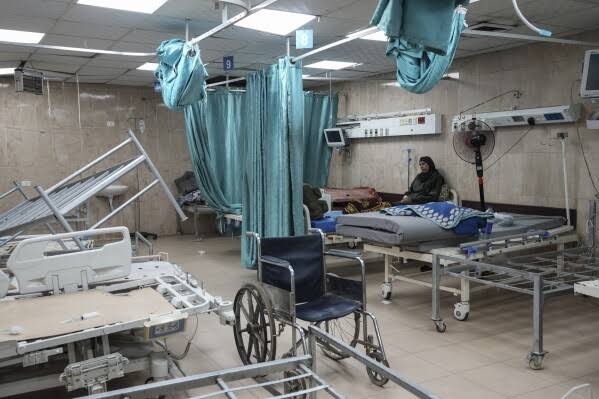– Rayyan Ali Khan
Crippling and life threatening diseases such as Polio & Hepatitis B, which are seen as the forgotten ailments of the past, have made a devastating comeback in Gaza, particularly affecting the children.
The resurgence of the diseases is a direct result of the destruction of Gaza’s healthcare and wastewater management infrastructure, a horrifying consequence of Israel’s continued bombardment. The extensive damage to this critical infrastructure has left the residents inaccessible even to the basic sanitation and healthcare, triggering the spread of life-threatening diseases.
The healthcare system in Gaza is completely decimated and hardly functional, in several areas, given the endless bombardments of hospitals.
The World Health Organization (WHO) has registered more than 1,000 attacks on healthcare facilities in the Occupied Palestinian Territory since October 7.
In a press briefing, Dr. Rik Peeperkorn, WHO representative for the West Bank and Gaza, told journalists there are currently no functional hospitals in the enclave’s southernmost city of Rafah, following Israel’s recent offensive there.
Long standing assault has also resulted in a spike in the collective trauma and mental health disorders. According to the statistics cited by relief web international, the mental health crisis in Gaza has affected all 2.2 million residents and humanitarian workers.
The WHO official has also highlighted the urgency of allowing critically ill patients to leave Gaza, stating that around 10,000 patients still require urgent evacuation, half of whom are suffering from severe trauma – including spinal injuries and amputations.
WHO had earlier recorded a staggering total of 890 attacks on health facilities, with 443 occurring in Gaza and 447 in the West Bank, since October 7, 2023. The number has now surpassed 1000.
Apart from the assault on healthcare infrastructure, the wastewater management system, which is responsible for treating and safely disposing of sewage, has also been completely put upside down. This includes sewage pipelines, water treatment plants, and septic tanks, all of which play a vital role in purifying water and preventing health risks. With the decimation of this infrastructure, the population is now facing an unprecedented health crisis.
A recent United Nations report highlights that, following forced displacements in June, many people had moved to areas where clean water was scarce, with raw sewage flowing through streets near makeshift camps. This situation has given rise to a host of other diseases, including Hepatitis, Pneumonia, and various skin infections, in addition to Polio.
Dr. Ahmed Al-Far, a pediatric consultant at a hospital in Gaza, has cited the collapse of sanitation systems as the primary cause of these outbreaks. He explains that the contamination of clean groundwater with sewage, coupled with overcrowding, extreme heat, poor ventilation, and the overuse of shared bathroom facilities in cramped tents, has created a perfect storm for the spread of disease. In this dire context, basic hygiene and healthcare services are virtually non-existent, posing a severe risk to the health of both children and adults.
Satellite images obtained by the BBC corroborate the unfolding disaster, showing large volumes of untreated sewage flowing into the Mediterranean Sea near Gaza’s Deir al-Balah coast. With no other option, residents have been forced to dump human waste directly into the sea, severely degrading water quality and exacerbating environmental problems. Images from August 2 show that this sewage discharge has spread across more than two square kilometres, starting in June and steadily increasing over the subsequent months, further deteriorating local environmental conditions.
The situation at Sheikh Radwan Pond in Northern Gaza, once filled with clean rainwater, also paints a grim picture. Now contaminated with sewage, the pond’s pollution is not only affecting the water quality but also posing a serious threat to local wildlife. Oxfam’s water and sanitation expert, Lama Abdel Samad has verified the accuracy of these satellite images, calling the situation alarming.
Gaza residents, speaking to the BBC’s Gaza Lifeline Emergency Radio Service, have described sewage overflows, unbearable stench, and the emergence of disease-carrying rodents around the contaminated lagoon.
Coming back to the healthcare crisis, living conditions in Rafah today are not conducive to the survival of people who are stuck there. There is a desperate shortage of clean water for drinking or bathing, while rubbish and raw sewage accumulate in the streets in this tiny wedge of land now hosting more than one million people who have been forcibly displaced from the north of Gaza, as per the reports of msf.org, which they claim, have been drawn on medical data and the testimonies of patients.
“As hospitals are overwhelmed with trauma patients, people with other types of medical needs, such as pregnant women with complications and people living with chronic diseases, are often unable to receive the care they require. In the Emirati hospital, where MSF is supporting the postpartum department, medical teams struggle to deal with close to 100 deliveries a day, five times more than before the war.” msf.org reports.
The genocide had compelled surviving Palestinian population to survive on merely the essentials but those essentials, too, are turning out to be a health hazard, rather than their role as tools of survival.
Despite global awareness of the deteriorating conditions, there has been little to no meaningful intervention to alleviate the suffering of Gaza’s population.
Sylvain Groulx, an emergency coordinator at MSF stated, “Palestinian medical staff are highly skilled and only need to be given the means to work in acceptable and dignified conditions to treat and save lives. But today all this remains absurdly impossible. Without an immediate and sustained ceasefire, and the entrance of meaningful humanitarian assistance, we will continue to see more people die.”
This escalating crisis has worsened the humanitarian situation in Gaza, highlighting the urgent need for international aid and immediate action to restore basic services. Without intervention, the region faces a growing public health emergency that could lead to further widespread suffering and disease outbreaks.




